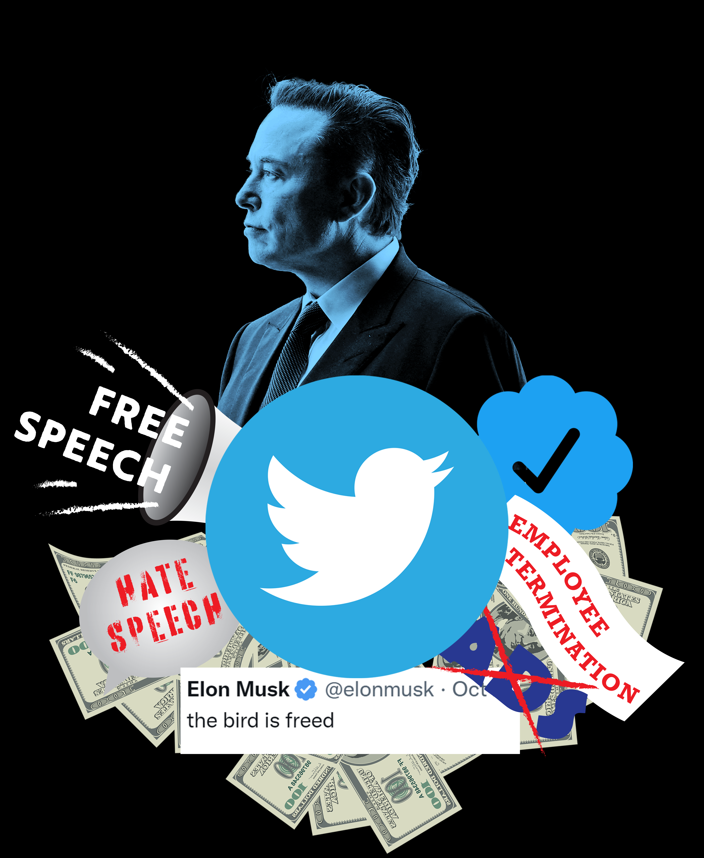World’s Wealthiest Man Purchases New $44 Billion Project
Elon Musk has officially purchased Twitter for $44 billion. The wealthiest man alive completed his acquisition of the platform after months of demurring, public melodrama and looming legal challenges. Musk’s first days as CEO indicate such issues may continue.
Musk formally closed his deal to acquire the social media platform the night of Oct. 27. Three days later, in response to the attempted kneecapping of Speaker of the House Nancy Pelosi and the hammer-aided assault on her husband, Paul Pelosi, Musk hopped on Twitter to disseminate an article claiming P. Pelosi was ensnared in a drunken brawl with a male prostitute. Musk later took the post down, though no explanation followed.
Days before, hate speech jumped nearly 500% on Twitter after Musk made himself CEO. “The bird is freed” Musk tweeted before the tirade, alluding to his position as CEO and his earlier promises to roll back community guidelines.
James Clune, instructor in the communications and media department at Seattle University, likened the hateful tweets circulating on Twitter to the spike in public expressions of white supremacy after former President Donald Trump’s election in 2016.
“Just like Trump’s election was seen by many racists and white supremacists as permission to come out of the closet and wave their flag, I think there are bad actors who see Musk’s purchase of Twitter as permission [to engage in similar behavior],” Clune said.
Back in April, when Musk first entered the agreement to purchase Twitter, he announced his commitment to free speech absolutism and described Twitter as a digital town square where matters vital to the future of humanity are debated.
Musk’s claim to the free speech mantel rests upon the assertion that Twitter should be open to all legal forms of speech. Before the platform was under his purview, Musk and other conservative opinion makers often bemoaned the alleged censorship of their First Amendment rights. For media scholars like Caitlin Carlson, department chair and professor of communications at Seattle U and author of “Hate Speech,” the argument that Twitter unfairly censors free speech is a deceptive fallacy. Carlson noted that free speech is a constitutional right that individuals forfeit as they agree to the terms of service on private platforms.
“[Twitter] is a private platform, [individuals] have no right to free speech on a private platform,” Carlson said.
As Musk looks to subdue various community guidelines on the platform, he has to balance the fact that Twitter depends on its ability to remain a reputable place for advertisers and influential users. Musk already sought to assuage corporate uneasiness, but many remain skeptical.
“[If Twitter turns into a] hellscape of nastiness, advertisers are going to flee,” Clune said.
92% of Twitter’s revenue came from advertisements last year. After Musk privatized the company and initiated a stream of high-profile dismissals, organizations such as Media Matters, Free Press and many others implored Twitter’s top advertisers to abstain from working with the platform. General Motors, Pfizer, Spotify, General Mills and other major advertisers have paused ad campaigns on the platform. Meanwhile, multinational ad corporations Interpublic Group and Havas Media have recommended clients pause advertising on the platform.
In an interview Nov. 4, Musk described activist groups pressuring major advertisers to pull their resources from Twitter as an attack on the First Amendment.
But Twitter’s fiscal issues don’t end with advertisers.
“Musk’s larger issue is how much of the content is produced by a small number of users,” Carlson said, referencing data that shows the top 25% of Twitter users account for 97% of all tweets.
Since Twitter commodifies user interaction with the platform, either to sell ads or mine data, the site can’t exist without its top users. According to Carlson, Twitter’s mostly liberal consistency is likely to leave the service for platforms like Mastodon and Facebook if Twitter degenerates into a site rife with disinformation and prejudice.
Facing a confluence of behind-the-scenes challenges, including Twitter’s moody profit cycles, a $13 billion loan and strong evidence he paid $19 billion over Twitter’s fair value, Musk has employed a range of propositions to save money and boost profits. Charging $8 for verified blue checkmarks, sealing pornography behind a paywall and revamping the social media platform Vine have all taken a back seat after Musk fired nearly half of Twitter’s 7,500 person workforce.
Of the almost 3,700 workers fired with scant notice, five former Twitter employees filed a class-action lawsuit alleging Twitter violated a federal law known as the Worker Adjustment and Retraining Notification that requires employers give a 60-day notice before initiating mass layoffs.
Dismissals at Twitter came only three days before the Midterm Elections, inciting much uneasiness over the potential for unchecked election misinformation to proliferate on the platform. In recent years, Twitter’s curation team worked to combat misinformation by adding context and disclaimers to untrue posts. Three days before the Midterm Elections, the entire curation team, along with thousands of their colleagues, were fired.
Sarah Cate, assistant professor of political science at Seattle U, noted that while Musk’s initial decisions as Twitter’s CEO exacerbate the shortcomings of the platform, the private ownership of social media networks are the true source of the problem.
“Many scholars are pointing to the resonances between the tobacco industry in the mid-to-late 20th century and the contemporary social media industry,” Cate said. “The similarities are clear: here is this ostensibly benign industry that accrues a large consumer base, and only later do we find out their products kill people. In the case of privately owned social media outlets, the harmful effects not only take a toll on individuals, they reverberate into our political and social spheres.”


